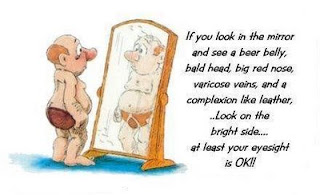 I was listening to NPR yesterday, and after spending most of the newscast on post-election deconstructing and analysis, out came this little story about a link between "looking old" and some specific physical characteristics, and an increased risk of having a heart attack.
I was listening to NPR yesterday, and after spending most of the newscast on post-election deconstructing and analysis, out came this little story about a link between "looking old" and some specific physical characteristics, and an increased risk of having a heart attack.Here are the main signs you want to avoid, according to this study.
1. A bald patch on the top of your head
2. A small vertical crease in your earlobe
3. Receding hairline
4. Fatty deposits on the eyelids
Um, this does not bode well for a majority of men over 40.
Here's the story:
Can looking old for your age increase your risk of getting heart disease?
Having baldness, receded hairline, crease in earlobes and fat deposits on eyelids increases your risk of developing heart disease.
By Joseph Brownstein, MyHealthNewsDaily
A bald patch on the top of your head or a small vertical crease in your earlobe may seem likerelatively harmless signs of aging, but a new study says signs like these may signal an increased risk of heart disease.
Danish researchers found that people were 39 percent more likely to have heart disease, and 57 percent more likely to have a heart attack, if they had at least three of these four signs: baldness on top of the head, receded hairline, a crease in the earlobe, and fatty deposits on the eyelids known as xanthelasmata.
The researchers accounted for people's ages in their results.
Therefore, the study shows "looking old for your age, by [having] these aging signs, marks poor cardiovascular health," said study researcher Dr. Anne Tybjaerg-Hansen, a professor and chief physician in the department of clinical biochemistry at Copenhagen University Hospital.
While the exact reason for the links between these signs and heart disease risk remains unclear, the study "validates the common clinical practice that the clinician examines the patient, and often looks at whether a person looks older or younger for her age," Tybjaerg-Hansen said.
The researchers used data from the Copenhagen Heart Study, which included 10,885 people who were over the age of 40. Over the 35-year study, 3,401 participants developed heart disease, and 1,708 had a heart attack. Researchers examined six physical features associated with aging, but found that two — gray hair and wrinkles — did not appear to be linked with increased risk of heart problems.
The study included 5,828 men and 5,057 women. When the researchers considered the genders separately, they found that hair loss in women was not linked with an increased risk of heart disease. However, among the 737 men who had a receding hairline, 82 suffered a heart attack, meaning there a 40 percent higher risk in men with hair loss than those without.
Previous research has looked at whether hair loss may be a warning sign of heart disease, but results have been conflicting. Some studies have linked the severity and type of baldness with the risks of heart disease or heart attacks to varying degrees, but others have found no connection. Because the risk of both heart disease and baldness rise with age, it can be difficult for researchers to separate the two in studies.
Tybjaerg-Hansen said the four signs identified in the new study should give clinicians greater incentive to treat patients who have them. "The suggestion is that lifestyle changes and lipid-lowering therapies should be intensified, because their risk is higher," she said.
However, the area needs more research, because "it would be nice to know why these [varying factors] would be associated with increased risk," she said.
Tybjaerg-Hansen said, for example, that hair loss is linked with levels of testosterone in the blood, so the new study suggests the hormone also plays a role in heart disease, but there's "no hard data there at all, [it's] only speculative."
She said the group for whom the new results would raise the greatest concern is men between ages 70 and 79. In this group, 45 percent of those with all four aging signs developed heart disease, versus 31 percent of those with none of the four.
"This study underscores the importance of doing a good physical exam, in addition to any testing we're going to do for risk for heart disease," said Dr. Nieca Goldberg, director of the NYU Center for Women's Health and American Heart Association spokesperson, in a statement in response to the study.
While the researchers adjusted their results to account for other risk factors for heart disease, Goldberg noted that, for example, xanthelasmata is a sign of high cholesterol levels, a traditional risk factor for heart disease.
Goldberg concluded that while the length of the study made the results compelling, doctors "need to continue to monitor our standard testing for heart disease risk, such as measuring cholesterol, blood pressure, glucose for diabetes."
The researchers are presenting their findings today (Nov. 6) at an American Heart Association research conference. The findings have not been published in a scientific journal.
Pass it on: Four signs of aging may be linked with heart disease risk.
